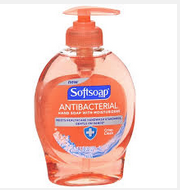 The ongoing debate over whether an antibacterial ingredient triclosan should be in soaps seems to have become an issue that seems to be finally settled.
The ongoing debate over whether an antibacterial ingredient triclosan should be in soaps seems to have become an issue that seems to be finally settled.
It should not be in there.
Yet, no doubt because of the increasingly germaphobic nature American public, antibacterial hand soaps have taken over the shelves at supermarkets. And why not? Bacteria are bad for you, so killing them when you wash your hands can only be good, right?
Nope. For three main reasons:
- It doesn't work
- Even if it did, it wouldn't matter
- When evaluating the benefit to risk ratio, if the benefit is zero, it's a big thumbs down. But the risk isn't zero here either, so even if there was some small benefit, it still could be a bad idea to put bactericides in soap.
Reason #1 became rather clear courtesy of a recently published study that appeared in The Journal of Antimicrobial Chemotherapy. The conclusion of Dr. S.A. Kim and colleagues from the College of Life Sciences and Biotechnology at Korea University in Seoul: "Antibacterial soap containing triclosan (0.3%) was no more effective than plain soap at reducing bacterial contamination when used under real-life conditions. The present study provides practical information that may prove useful for both industry and governments."
Reason #2 involves whether killing bacteria on your hands makes sense. Even if there was some utility to triclosan, would it matter? Probably not. When you think of the kinds of infections that people commonly catch colds, norovirus ("stomach flu"), influenza, bronchitis, others they have one thing in common: they are all viral infections, not bacterial, so all the triclosan in the world won't make a bit of difference.
Reason #3 has to do with the potential harm of using triclosan versus its benefit. The harm is the possibility of facilitating bacterial resistance, just about the last thing the world needs now. Even though triclosan is not used as an antibiotic, it can at least theoretically, and still have an impact upon antibiotic resistance.
ACSH advisor, and antibiotic expert Dr. David Shlaes explains:
"Bacteria can become resistant to triclosan by pumping the drug out of the bacterial cell before it can do any damage. These pumps probably exist to rid the bacteria of waste products and toxins that they either produce or encounter in the environment," he said. "Under certain circumstances, they can press the accelerator and these pumps work harder and faster as in the case of triclosan resistance. The problem is that these pumps are not very specific, and they can pump out a number of antibiotics as well as triclosan. In this way, triclosan resistance is actually resistance to multiple antibiotics. Not such a good thing."
So, I think it's safe to say that it is time to wash our hands of antibacterial soaps, for good.



